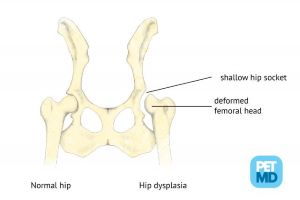Refining the Complex Genetics That Influence Canine Hip Dysplasia

Canine Hip Dysplasia (HD) is a complex disease of large dogs defined by an abnormal fit of the “ball and socket” hip joint. Because the ball does not fit tightly into the socket, there is abnormal movement within the joint that results in progressive and painful arthritis. HD is influenced by numerous genetic and environmental factors – such as diet and exercise.
Information on the detrimental effects of dogs being overweight or obese is plentiful, and the growing field of canine rehabilitation and sports medicine is beginning to provide objective data on safe and appropriate exercise for dogs of all ages and sizes. However, research on the complex genetic factors contributing to HD has remained problematic. It is challenging to accurately categorize dogs as affected or healthy because joint abnormalities and clinical signs occur along a sliding scale, as opposed to discrete categories. In addition, we now know that the genetic mutations contributing to HD can be breed-specific (a mutation associated with disease in Labrador Retrievers may not be problematic in German Shepherd Dogs). Despite these challenges, canine health researchers and dog breeders persist in their efforts to understand and manage this debilitating disease.
With funding from AKC Canine Health Foundation (CHF) Grant 01828: Mapping of Genetic Risk Factors for Canine Hip Dysplasia, investigators set out to overcome some of the limitations of previous genetic studies on HD. They examined DNA from a very large group of dogs (almost 1,600 dogs representing 10 different breeds) to improve the statistical validity of their findings. In these types of studies, the more dogs evaluated, the more likely results will be accurate. They also used strict and consistent criteria to categorize each dog as affected or healthy (the Fédération Cynologique Internationale (FCI) hip scoring system).
|
There are several hip evaluation systems in use across the globe, including:
The OFA, FCI, and BVA systems evaluate the phenotypic or observable characteristics of the hip joint. PennHIp provides a measurement of canine hip joint laxity or looseness. All are useful in managing the complex disease of canine hip dysplasia. |
Examining genes previously identified as influencing the development of HD, they confirmed 21 different loci (or locations) on 14 chromosomes that are significantly associated with the risk of HD in dogs.1 Four mutations were associated with HD across all breeds. Multiple mutations were associated with disease risk when breeds were examined individually (ranging from zero in Bernese Mountain Dogs to 7 in Labrador Retrievers). These results confirm the complexity of genetic influences on HD in dogs – including breed-specific mutations and those that affect all dogs.
Investigators also used artificial intelligence to search for implicated genes that may interact. This analysis showed that a biochemical pathway known as neddylation may be significant in the development of HD. Neddylation is involved in various cell functions, including the inflammation that contributes to clinical signs of HD.
These results validate previous studies on the genetic factors that influence canine HD and help prioritize which genes should be studied in more detail. The fact that these genes may be involved in inflammation also provides a hint at exactly how HD develops and progresses. CHF and its donors remain committed to studying complex and common diseases such as HD, cranial cruciate ligament rupture, osteoarthritis, and more. Learn about our musculoskeletal disease research at www.akcchf.org/musculoskeletalRPA.
- Mikkola, L., Kyöstilä, K., Donner, J., Lappalainen, A. K., Hytönen, M. K., Lohi, H., & Iivanainen, A. (2021). An across-breed validation study of 46 genetic markers in canine hip dysplasia. BMC Genomics, 22(1), 68. https://doi.org/10.1186/s12864-021-07375-x
Related Articles
Help Future Generations of Dogs
Participate in canine health research by providing samples or by enrolling in a clinical trial. Samples are needed from healthy dogs and dogs affected by specific diseases.



